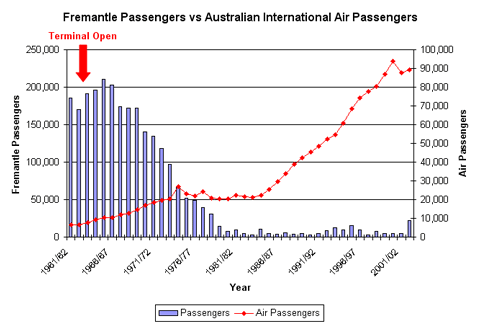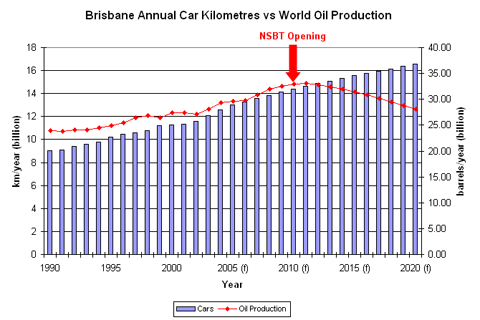Today's traffic problems in Australia’s fastest growing city, Brisbane, result from decades of neglect by a succession of state and local governments. Not long after being elected into office in 2004 on a platform of alleviating the city’s traffic congestion, Brisbane Lord Mayor Campbell Newman announced that Brisbane City Council would proceed with Queensland's largest public-private partnership to construct the North South Bypass Tunnel (NSBT), part of his TransApex project. From the outset, Newman has seen his role as “getting on with the job of reducing traffic congestion problems in Brisbane". Unfortunately Newman made one flawed assumption that plagued the project’s planning from the beginning and will soon likely see its demise – cheap oil.
Cheap oil has proved costly for previous transport infrastructure investments. Among these is the Fremantle Passenger Terminal, built in the early 1960s at a cost of £1.5 million, approximately $30 million in today’s dollars, to accommodate growing demand from passengers arriving from Europe during the "populate or perish" immigration era. What Western Australia’s planners did not foresee was that growing world production of cheap oil was simultaneously triggering the explosion of cheap international air travel. Within 15 years passenger arrivals plummeted to two per cent of their 1965 peak and the facility became largely redundant.
Passenger Numbers at Fremantle Passenger Terminal, 1961-2001
Advertisement

Here in Brisbane, the transition from growing production of cheap oil to declining production of expensive oil has been completely ignored in the planning for TransApex and the NSBT. Forecasts of increasing car traffic in the various feasibility studies, which have omitted any consideration of rising fuel prices, are highly unlikely to eventuate. Neither will pipe dreams of quickly replacing Australia’s car fleet with hybrid, ethanol or hydrogen cars, which take no consideration of the time, scale, economics or thermodynamics involved in such a transition.
The idea of 'market-driven' transition to increased vehicle fuel efficiency is itself without historical basis. Today's cars are only marginally more fuel efficient than those of the 1960s, indeed average fuel efficiency for new cars has actually worsened in the last five years as Australians continue to buy larger, heavier cars in an era of skyrocketing private debt and perverse tax policies that encourage increasing mileage an d consumption. The absurd fixation on building motorways to solve traffic congestion despite the imminent reality of peak oil is best described by James_Howard_Kunstler:
We are now hobbled by a tragic psychology of previous investment – that is, having poured so much of our late-20th century wealth into this living arrangement – this Happy Motoring utopia – we can't imagine letting go of it, or substantially reforming it.
Brisbane Annual Car Kilometres vs World Oil Production
Advertisement

The "can do" attitude towards building the NSBT despite clear evidence of the imminent peak in world oil production is nothing short of astonishing. When the initial feasibility study was completed in early 2005, Newman and Premier Peter Beattie appeared at a joint press conference in which Beattie offered BCC a loan of up to $450 million, stating that "The government supports the project, provided assumptions in the business case do not change in any way that would jeopardise state taxpayers' dollars". Yet the business case assumptions were invalidated by BCC planners long before the detailed feasibility study was finished. Unfortunately these concerns were ignored and contracts were signed which do jeopardise taxpayers’ money.
BCC decided to press on and close the deal on 31 July 2006. Shrouded in secrecy at the time, the contract with the RiverCity Motorway Group was signed on 7 August 2006, committing ratepayers to a $292 million completion fee, in addition to more than $100 million already committed for the flawed feasibility studies, legal fees and administrative costs. Costly indeed for a project in which the risks are supposed to be borne by the private sector.
Since construction of the tunnel began, a series of publicly available government reports have also gained little traction with policy-makers. A 2006 Federal Senate inquiry into peak oil went unreported in the local media. Planners and engineers ignored the submission to that inquiry from their own peak professional body, Engineers Australia, which warned that the economic risks arising from peak oil were "not being treated with sufficient urgency".
The contents of the 'other' Maunsell report, namely BCC’s Climate Change and Energy Taskforce Report released in April, were dismissed by Newman as "wacky", possibly because they threaten his "can do" TransApex vision:
We have been aware for many years of the need to shift more of our trips to modes other than private vehicles (especially those occupied only by the driver). … the Brisbane 2026 Vision goal is for 41 per cent of morning peak trips to be made by walking, cycling or public transport by 2026. …People’s past reluctance to take more trips by public transport might change rapidly in the face of escalating oil prices or fuel rationing.
In the same month, Government MP Andrew McNamara completed his Oil Vulnerability Taskforce Report, which concluded that "the overwhelming evidence is that world oil production will peak within the next 10 years" and that "regardless of the global peak oil issue, the risks of supply disruptions are rising". Despite Beattie’s efforts to bury this report it eventually made the front page of the Courier-Mail in September.
Perhaps the sense of denial might begin to change in mid-November when the OECD releases a peak oil study prepared by ASPO-International president Kjell Aleklett. In an excerpt already available on the internet, this report concludes:
In a business-as-usual case, the shortage of fossil fuel liquids for transportation will be substantial by the year 2030. The necessary decisions for the economic transformation required to mitigate this decline in available oil supply should already have been made and efforts to deploy solutions under way. We have climbed high on the "Oil Ladder” and yet we must descend one way or another. It may be too late for a gentle descent, but there may still be time to build a thick crash mat to cushion the fall.
While the clear message from these official reports for RiverCity Motorway’s investors is "sell", in the Orwellian atmosphere of the recent annual general meeting its executives were calmly conveying the “buy” or “hold” message even as oil prices climbed through the $US85 mark. CEO Bob Morris gloated:
We are continuing to monitor traffic growth on the roads that link to our tunnel. It is pleasing to note that the traffic volumes on the five major roads that will link directly to our tunnel continue to grow in line with our traffic model forecasts, despite the impact of construction on roads around the project. … the progress made this year is ensuring that project risks are steadily reducing. … The project is enormous, but by 2010 the benefits are set to be even greater.
The NSBT is indeed enormous – an enormous gamble on Brisbane’s happy motoring utopia 100 times greater than the Fremantle Passenger Terminal, with the hard-earned savings of ill-informed "mum and dad investors". Ken Davidson of The Age recently suggested that Melbourne's transport mandarins "will be able to decamp to Noosa to escape the urban mess they are creating" when the reality of peak oil strikes home. Noosa is obviously a bit too close to home for Brisbane's elite. Newman, who has long taken credit for solving Brisbane’s traffic congestion while outsourcing responsibility to the private sector, could head for Canberra and be the next Federal Shadow Minister for Transport. Rumour has it that Beattie has already packed his bags for Rome. RiverCity’s directors may be winging their way to the Cayman Islands even by the time you read this. Let’s hope they’ve packed some sunscreen and left their forwarding addresses with ASIC.
Over in the West, the old Fremantle Passenger Terminal is currently being used as a warehouse for imported cars. As Toyota Landcruisers and airline tickets become increasingly expensive in the peak oil era, no doubt it will eventually be re-commissioned as a passenger terminal. Sensible options like this are out of the question for Brisbane’s soon-to-be-redundant, $3 billion hole in the ground. Wine cellars and mushroom farms both have their merits, but the tunnel would probably best be used as a storm-water reservoir to alleviate the impact of Southeast Queensland’s 'worst drought in history', a.k.a. climate change. It will certainly hold water more effectively than the Traveston Dam.
From a public interest perspective, the construction costs for three of Brisbane’s road projects alone – the Gateway duplication, the NSBT and the Airport Link – equate to the entire budget for South East Queensland rail and public transport projects scheduled for the next 20 years. The construction of these motorways at the dawn of the peak oil era represents a tragic failure of governance and probity unprecedented in Queensland’s history.
This is an edited version of an article that was first published on The Oil Drum: Australia/New Zealand.